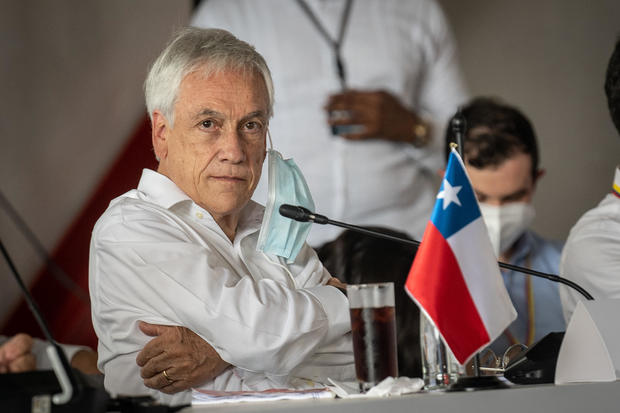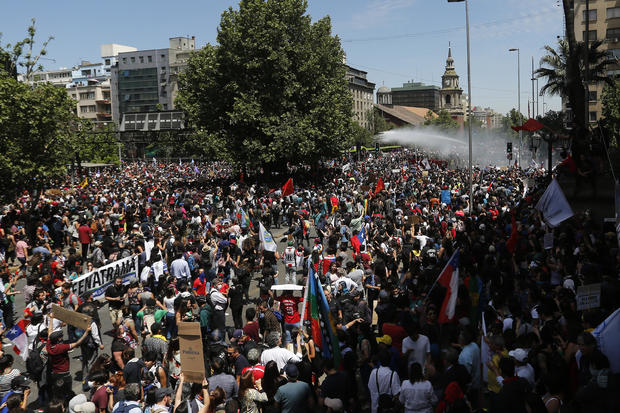Sebastián Piñera, former president of Chile, dies in helicopter accident
Sebastián Piñera, a two-time former president of Chile, died Tuesday in a helicopter accident. He was 74.
Chile Interior Minister Carolina Tohá confirmed the death of the former president. No further details were immediately released about the cause of the accident.
Piñera was among four passengers in the aircraft, and the others are "out of danger," Tohá said in televised remarks Tuesday afternoon.
"A few moments ago we received confirmation from police that the navy was able to reach the place where the accident happened and they recovered the corpse of former president Piñera, who died," Tohá said, adding that Chilean President Gabriel Boric has ordered a state funeral and declared a few days of national mourning.
Chilean media Tuesday afternoon shared a statement published by Piñera's office confirming his death.
"During the afternoon of this Tuesday, February 6, 2024, the former president suffered an aerial crash in the Los Ríos Region," the statement said, adding, "We appreciate the massive expressions of affection and concern that we have received during these bitter hours."

President Boric delivered an address in which he said he was in touch with former presidents Eduardo Frei, Ricardo Lagos and Michele Bachelet, all of whom "will do everything possible to participate in his funeral."
"We are all Chile, and we should dream it, draw it and build it together," Boric said, quoting Piñera. "We send a big hug to his family and loved ones in these hard times."
Piñera served as president from 2010 to 2014 and again from 2018 to 2022. He led the South American nation during devastating natural disasters, including the fallout of an earthquake and a tsunami.
He also governed during the coronavirus pandemic and placed Chile among the top five countries for vaccination rates for the illness.
His legacy is marred by violent police repression in October 2019 against protesters who were demonstrating against the country's education, health and pension systems.
Tens of thousands of protesters swarmed Chile's capital during the 2019 protests, setting up fiery barricades and clashing with riot police after an apology and promises of reform from Piñera failed to calm the unrest that had led to at least 18 deaths.
The movement started with anger at a small rise in subway fares, but blew up into protests demanding improvements in education, health care and wages in one of Latin America's wealthiest, but most unequal nations.

The social unrest ultimately led to two attempts to update the constitution inherited from the military government, but both have failed.
Piñera was the owner of the fifth largest fortune in Chile, estimated at some $3 billion. He worked as an academic in several universities for almost 20 years and as a consultant for the Inter-American Development Bank and the World Bank.
As a businessman in the 1970s through the 1990s, he worked in a variety of industries, including real estate. He held shares in major airlines and telecommunication, real estate and electricity companies. He also created one of the largest credit card companies in the country. In 2009, he handed over the management of his businesses to others.
He entered politics representing the center-right. However, when he served as an independent senator, he voted against extending the rule of dictator Augusto Pinochet (1973-1990).
He ran three times for president of Chile. In 2006, he lost to socialist Michelle Bachelet; then in 2010 he defeated former president Frei. Four years later, in 2018, he won a second four-year term after defeating a leftist independent.
Twelve days before the beginning of his first term, an 8.8 magnitude earthquake and a tsunami claimed the lives of 525 people and devastated the infrastructure of central-southern Chile.
Piñera's government agenda was postponed in order to take on emergency reconstruction. In 2010, he also led the unprecedented rescue of 33 miners trapped for 69 days at the bottom of a mine, which captured the world's attention.
Brazilian President Luiz Inacio Lula da Silva wrote on social media that it was sad that Piñera had died so "abruptly."
Argentinian President Javier Milei sent condolences, as did his predecessor, Cristina Fernández de Kirchner.
- In:
- Chile
- Politics
Disclaimer: The copyright of this article belongs to the original author. Reposting this article is solely for the purpose of information dissemination and does not constitute any investment advice. If there is any infringement, please contact us immediately. We will make corrections or deletions as necessary. Thank you.







